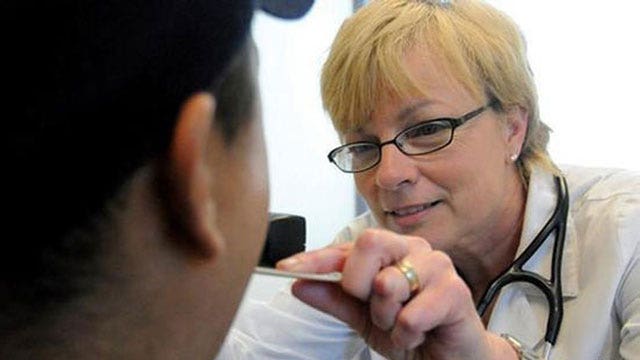Truth Serum: Cost of health insurance premiums
Eric Shawn and Shannon Bream break down ObamaCare fees and frequency of school shootings
Despite the recent Supreme Court ruling upholding ObamaCare subsidies, opponents of the law remain poised to strike a key blow against another component of the health care overhaul in a matter of months.
Republicans, with help from Democrats, have gained momentum in their long-running effort to repeal the law's controversial 2.3 percent excise tax on medical devices.
The House voted 280-140 to nix the tax, which went into effect in 2013, in June; the debate heads next to the Senate. While Republicans have tried dozens of times to unravel all or parts of the law through repeal legislation, this bill has bipartisan backing -- and, with a potential veto showdown on the horizon, supporters may even have a veto-proof majority.
"Obviously, we are really heartened by the House vote -- I think more significantly, 46 Democrats joined with the Republicans in the House," said J.C. Scott, head of government relations for the trade group Advanced Medical Technology Association, of AdvaMed, which has been lobbying Congress hard for a repeal. It released surveys detailing the tax's negative impact on its member companies in 2014 and 2015.
Scott said, "Clearly the congressional spirit is there on a bipartisan basis to get something done by the end of the year" in the Senate.
"I think the will is there," he said.
Indeed, Senate Majority Leader Mitch McConnell, R-Ky., wants to see action on the repeal by the end of 2015, his office told FoxNews.com.
A bill introduced in January by Sen. Orrin Hatch, R-Utah, has five Democratic co-sponsors, including the two liberal Democratic senators from Minnesota, Amy Klobuchar and Al Franken, as well as Sens. Bob Casey, D-Pa., and Jeanne Shaheen, D-N.H.
The push has enjoyed bipartisan support from the beginning from lawmakers who think the tax has cost the country thousands of jobs in the medical device industry and is drying up resources for private research and development.
"Both Republicans and Democrats understand how bad this tax really is and we owe it to the American people to ensure the development of life saving medical devices are not plagued by high costs that will, ultimately, be passed on to patients," Hatch said in January.
The tax is supposed to help pay for ObamaCare, bringing upwards of $30 billion into the program over 10 years. It applies to all gross company sales of non-retail medical devices and supplies, from X-Ray equipment and MRI machines to bandages and surgical tools. Because it is a 2.3 percent tax on gross sales, the percentage it takes out of profits is much larger.
The repeal push once had even liberal Sen. Elizabeth Warren, D-Mass., on board when the Democrat-led Senate passed a non-binding budget amendment dealing with the issue in 2013. "When Congress taxes the sale of a specific product through an excise tax, as the Affordable Care Act does with medical devices, it too often disproportionately impacts the small companies with the narrowest financial margins and the broadest innovated potential," she said in 2013.
It is not clear whether she is supporting Hatch's latest bill, given she has been a strong supporter of ObamaCare overall.
But the number of Democrats who voted for repeal in the House, coupled with the support Democrats have shown for repeal in two previous non-binding budget resolutions in the Senate, indicate the latest bill at least has enough support to pass Congress. McConnell's office said pro-repeal lawmakers also believe they have enough votes in both chambers to override a veto, which the White House has threatened.
Repealing the tax, the White House said in June, would amount to a "large tax break to profitable corporations."
"This excise tax is one of several designed so that industries that gain from the coverage expansion will help offset the cost of that expansion," said the Office of Management and Budget in a statement. "Its repeal would take away a funding source for financial assistance that is working to improve [health care] coverage and affordability and would increase the Federal deficit by $24.4 billion over 10 years."
Supporters of the tax say there is no real evidence it is killing more than 30,000 jobs, as claimed by the AdvaMed survey, or that it will ultimately shift jobs overseas. The Washington Post's Fact Checker gave these claims two "pinocchios" in 2014 and three on June 30 after reviewing them.
The paper said the impact of the tax on companies is actually smaller -- closer to 1.5 percent -- because companies can claim a deduction on their federal income taxes.
Fact Checker also pointed to a Congressional Research Service study that found the impact of the tax on jobs and R&D negligible, and pointed to another survey of medical device companies by the Emergo Group that found that nearly 57 percent said they did not make any significant staff cuts due to the tax, compared with 14 percent who did.
When asked if the tax was squeezing funds for R&D, White House Press Secretary Josh Earnest told reporters in January, "I don't think there's any reason why that medical device tax would in any way limit the kind of innovation that the president believes could revolutionize health care."





